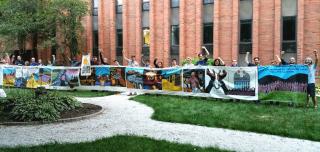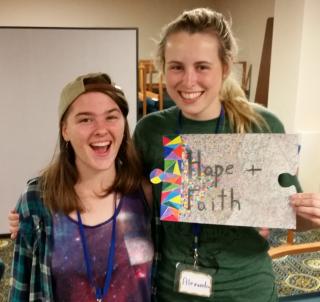Whiteness and Apocalypse
By Elizabeth Nguyen
Earlier this summer, I interviewed a local climate activist who told me that according to one study, by 2030 we would know if we hit the two degree celsius temperature change, a crucial tipping point. That in fifteen years we would pretty much know how much we were screwed. While these types of doomsday scientific reports circulate regularly and the exact numbers are debatable, somehow hearing it in the context of his personal investment hit me deeper than before. Since that conversation, I’ve felt desperate, frantic and apocalyptic – but also revolutionary, that something big would have to change. I felt a renewed purpose and urgency in my climate work, which until then had felt distanced; I paid attention to news, read Naomi Klein and went to major protests, but didn’t really feel like I could commit as much to the movement as I’d wanted.
About a month later, one of my friends, a woman of color, said she didn’t like the environmental movement. When I asked why, she laughed and said because it’s so white. I agreed, but was frustrated, because even though I was white, I resented the reputation of whiteness in a movement that I know to be more intersectional and that I want to be more explicitly intersectional because it needs to be. I tried to argue that it’s more than protecting trees and water, and that climate change affects us all.
For now, it seems like my front-line is my campus. The brand of environmentalism at our campus – a small liberal arts college in the mid-west – is as white as a blizzard. Our environmental club, though popular, mainly goes on week-long backpacking trips during semester breaks, and lacks a divestment movement. The administration touts sustainability efforts just like the next college, but there is an overall lack of discourse around climate change, and especially around justice. People care about it, sure, but most people get too overwhelmed and feel like we couldn’t do anything about it, or that it isn’t relevant, and often get stuck in “save the Earth” thinking.
Looking back at when I started to care about environmentalism and climate change about ten years ago, I recognize that my early investment lacked a critical analysis of power systems. Like many Unitarian Universalists in climate work, I resonate deeply with the seventh principle, the interconnectedness of all things. I often envision our planet in space, and think about all of us sharing this home. In a social justice context, this also means that my liberation is tied up into yours. But I don’t think we – as a movement – are there yet, as someone at the training expressed.
One example, among many: a reasonable critique of vegans and vegetarians, many of whom are white (including me), is that they seem to care more about the health and safety of animals than for other people. Changing consumer choices in the context of capitalism is relatively easy compared to critically looking at how I am implicated in a white supremacist (capitalist, patriarchal) society.
I realized that my values of caring about climate change led me to critically look at systems of power and societal inequalities. In other words, I admit that while I cared about social justice in a very white middle class liberal way, it was climate change that got me to understand the complexity and depth of power systems, and my own privilege. To care about climate justice is to care about anti-racism, feminism, anti-capitalism, anti-injustice and anti-oppression, and to fight for liberation. Climate change is only the latest symptom of these oppressive systems. Of course, it is still a choice to engage in anti-oppressive work, and not all climate work means climate justice, and climate justice does not mean simply adding “justice” to the end of it.
It is important to remember and understand each of these anti-oppression movements have different histories and are not the same. Anti-racist work cannot always be lumped with climate justice work. Yet it is crucial to make the connections between the movements.
One of the most impactful parts of the training came after looking at different definitions of climate justice, and one of our facilitators asked us to reflect on how, or if, our goals dismantle the master’s house, and how, or if, our tactics are accountable to the environmental justice principles. I know that this question needs to be considered continuously throughout any work, and I know that the work being done on my campus is not there yet. After the GROW training, I understand more than ever the urgency to challenge this white, privileged environmentalism and bring in a climate justice framework, and, importantly, I feel more prepared to do so.
I am determined to bring this awareness and analysis back to my campus. We’ll still go backpacking, and I will make sure we talk about the master’s house in the context of climate justice principles. I suspect many a college campus are stuck in white environmentalism, though many have been struggling for divestment from fossil fuels. I also want to start a divestment campaign, though this feels like a lofty goal at this point for where my campus’s values lie.
I know that this awareness is not enough, that there must be action. Yet it is a concrete step forward, and I know I will keep learning. As a participant said, we are responsible for collective learning.
Along with organizing skills, the GROW training gave me a space to truly examine and express my despair over climate change, the deep kind I felt at the beginning of the summer. It is easy to become fixated on the dystopian projections of extinction – of other species and possibly our own – destruction, and loss of the life we are used to, and to focus on climate change as an urgent crisis. Yet the problem with this is that this apocalypse has been real and remains urgent for so many for centuries. It is not about oppression olympics, or a hierarchy of despair, but it is about urgency.
The face of the climate movement may still be very white. Yet the crucial part is making sure front-line communities take the lead, and that those with privilege take the time to critically examine their positionality, and remain accountable to climate justice principles. As a facilitator said, we need to struggle together and resist collapses, and it’s up to us if there’s to be justice on the other side. Amelia studies Environmental Communication and Arts at Beloit College in Wisconsin. Originally Quaker, she joined her local UU congregation in high school. She’s interested in how art is used in social movements, and in particular writing and photography. In addition to her environmental activism, she leads an interfaith student group organized for incarceration justice. Follow her blog of conversations with climate activists at www.newclimategossip.wordpress.com.




![Photo courtesy of Elizabeth Nguyen. photo1[5]](/files/styles/max_320x320/public/jpg/p/photo15.jpg?itok=o9CGlMGp)